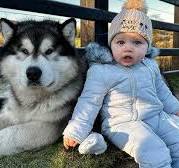Welcoming a baby:czziykpdt-q= dog into your home is a delightful experience that brings joy and responsibility. This term refers to the early developmental stage of a dog, commonly known as a puppy. Puppies require careful attention and nurturing to ensure they grow into healthy, well-behaved adult dogs. Understanding the various stages of a puppy’s development is crucial for providing the right care and training at each phase.
From the moment they are born, puppies undergo rapid changes in their physical and behavioral development. These stages include the neonatal phase, where they rely heavily on their mother, the transitional phase, where they begin to explore their surroundings, and the socialization phase, where they learn to interact with humans and other animals. Each phase comes with its own set of challenges and joys, and being informed can help you navigate this exciting journey effectively.
Table of Contents
Understanding the Developmental Stages of a baby:czziykpdt-q= dog
The developmental journey of a baby:czziykpdt-q= dog is divided into several key stages, each with unique characteristics and requirements. These stages help in understanding how puppies grow and what they need at different times in their early life. The first stage is the neonatal phase, which occurs from birth to about two weeks old. During this time, puppies are entirely dependent on their mother for warmth, nutrition, and care. They are born blind, deaf, and toothless, relying on their sense of touch and smell to navigate their immediate surroundings. This phase is crucial for the puppy’s survival and development.
Following the neonatal phase is the transitional phase, spanning from two to four weeks of age. This period is marked by significant changes as puppies begin to open their eyes, develop hearing, and start to grow teeth. It’s a time of rapid sensory development, where they start exploring their environment more actively. Puppies also begin to develop basic motor skills, which is essential for their growth and coordination. Understanding these early stages is vital for any pet owner as it sets the foundation for a puppy’s health and behavior in the later stages of its life.
Neonatal Phase
During the neonatal phase, a baby:czziykpdt-q= dog is in a state of complete dependency. Puppies are born without the ability to see or hear, as their eyes and ear canals are closed at birth. They spend most of their time nursing and sleeping, essential activities for their growth and development. At this stage, the mother’s presence is vital, providing warmth, nourishment, and protection. Puppies rely on their mother to regulate their body temperature, as they cannot do so themselves.
In this phase, handling should be minimal to avoid causing stress to both the mother and puppies. However, gentle handling under supervision can aid in the puppies’ early socialization. It’s also important to ensure that the puppies are nursing well and gaining weight steadily, as this is an indicator of their health and vitality. Any signs of weakness or lack of growth should prompt a visit to the veterinarian to rule out any health issues. This stage is the foundation of a puppy’s development, and proper care can ensure a healthy start to life.
Transitional Phase
In the transitional phase, puppies undergo significant changes as they start to interact more with their environment. Their eyes begin to open, usually between 10 to 14 days, and they gain the ability to hear at around two weeks. This period marks the beginning of sensory development, allowing puppies to explore their surroundings and recognize familiar faces and sounds. During this time, their teeth start to emerge, making them more interactive and curious.
This phase is also when puppies begin to learn basic motor skills. They start standing, walking short distances, and engaging in play with their littermates, which is crucial for developing social skills and coordination. Introducing a variety of toys can encourage exploration and help with motor development. It’s essential to provide a safe and stimulating environment to foster these new abilities. Regular handling by humans should be gentle and positive, aiding in early socialization and helping puppies become accustomed to human touch.
Socialization Phase
The socialization phase is a critical period in a baby:czziykpdt-q= dog development. This is when puppies learn to interact with people and other animals, shaping their behavior and temperament for the rest of their lives. During this time, puppies should be introduced to a wide range of experiences, such as different people, environments, and sounds. Positive exposure to various situations helps prevent fear and aggression later in life.
Training should also begin in this phase. Basic commands like “sit,” “stay,” and “come” can be introduced using positive reinforcement techniques. Consistency and patience are key to successful training. Socialization classes or puppy kindergarten can be beneficial, providing structured opportunities for puppies to meet others in a controlled environment. This period is about building confidence and resilience, helping puppies grow into well-adjusted adult dogs.
Ranking and Adolescence
The ranking and adolescence phase is a time of continued growth and development for a baby:czziykpdt-q= dog. During this period, puppies begin to establish their place within the social hierarchy of their household. They may test boundaries and exhibit increased independence. This phase coincides with teething, which can lead to chewing and other behavioral issues if not managed properly.
Training should continue with an emphasis on reinforcing positive behaviors and correcting undesirable ones. Adolescence is a time when consistency in training is crucial, as puppies may display more challenging behaviors. Exercise and mental stimulation are vital to channel a puppy’s energy productively. Owners should remain patient and persistent, understanding that this is a normal developmental stage.
Essential Care Tips for Your baby:czziykpdt-q= dog
Providing the right care for your baby:czziykpdt-q= dog is crucial for its overall health and well-being. This involves ensuring proper nutrition, regular veterinary care, and creating a safe environment.
Nutrition and Feeding
Feeding your baby:czziykpdt-q= dog the right diet is vital for its growth and development. Puppies require a diet rich in protein, vitamins, and minerals to support their rapid growth. High-quality puppy food, specifically formulated for young dogs, is recommended. It’s important to follow feeding guidelines based on the puppy’s age, weight, and breed size. Overfeeding can lead to obesity, while underfeeding can result in nutritional deficiencies.
Gradually transition your puppy to solid food, starting around three to four weeks of age, while continuing to offer mother’s milk or a suitable milk replacer. A feeding schedule with multiple small meals throughout the day is often best, as puppies have small stomachs and high energy needs. Always ensure fresh water is available.
Health and Veterinary Care
Regular veterinary care is essential for maintaining your puppy’s health. Vaccinations protect against diseases like parvovirus, distemper, and rabies, and should be administered according to a vet-recommended schedule. Puppies also require deworming treatments and flea prevention. Regular check-ups allow for monitoring growth, weight gain, and overall health.
During these visits, discuss any concerns with your vet, including behavioral issues or dietary questions. Early spaying or neutering can be discussed as well, typically around six months of age, which can prevent health and behavioral problems. Dental care should also start early, with puppy toothbrushes and dental chews to promote oral health.
Creating a Safe Environment
Creating a safe environment for your baby:czziykpdt-q= dog is crucial. Puppy-proof your home by removing hazards such as electrical cords, small objects that can be swallowed, and toxic plants or chemicals. Use baby gates to block off unsafe areas and provide a designated space for your puppy to play and rest.
Providing a comfortable sleeping area with a cozy bed in a quiet part of the house is important for rest and relaxation. Puppies need plenty of sleep for healthy development. Safe toys can help with teething and prevent destructive chewing on furniture or other items.
Training Your baby:czziykpdt-q= dog
Training is a vital part of raising a well-behaved and happy dog. It helps establish boundaries and ensures your puppy grows into a socially adjusted adult.
House Training and Obedience
House training should begin as soon as you bring your puppy home. Establish a routine for bathroom breaks, taking your puppy outside frequently, especially after eating, drinking, or waking up. Positive reinforcement, such as treats and praise, can be used to encourage good behavior. Consistency and patience are key, as accidents are a normal part of the learning process.
Obedience training involves teaching basic commands like “sit,” “stay,” “come,” and “leave it.” Short, frequent training sessions using positive reinforcement help maintain a puppy’s attention and encourage learning. Training should be a fun and rewarding experience for both you and your puppy.
Socialization and Behavior
Socialization is critical to preventing fear and aggression in adult dogs. Introduce your puppy to a variety of people, animals, and environments during the socialization phase. Positive experiences help build confidence and adaptability. Enroll your puppy in socialization classes or playdates with other vaccinated puppies to enhance social skills.
Behavioral training focuses on discouraging undesirable actions such as biting, barking, or jumping. Redirecting a puppy’s attention and using positive reinforcement to reward good behavior can effectively address these issues. Consistent rules and expectations from all family members are essential to prevent confusion and reinforce learning.
Balancing Care for a baby:czziykpdt-q= dog and a Human Baby
Raising a puppy alongside a human baby can be challenging but rewarding. Proper planning and organization can help ensure both receive the care and attention they need.
Managing Time and Attention
Managing time effectively is crucial when caring for a puppy and a baby. Establish a routine that includes feeding, playtime, and rest for both. Consistency helps puppies feel secure and can aid in their training. Involve all family members in the care of both the puppy and the baby to distribute responsibilities.
Use tools like baby carriers or strollers to keep your hands free while managing the puppy’s needs, such as walks or playtime. Combining activities, like taking the baby and puppy for a walk, can be efficient and enjoyable. It’s important to set aside time for one-on-one interactions with each to strengthen bonds and address individual needs.
Safety and Interaction
Safety is a priority when raising a baby and a puppy together. Always supervise interactions to prevent accidental harm or fear-based reactions. Teach your child how to approach and interact with the puppy gently and respectfully. Puppies should have safe spaces to retreat to if they feel overwhelmed.
Introducing a new baby to a household with a puppy requires preparation. Allow the puppy to explore baby items and become familiar with new sounds and smells. Use positive reinforcement to reward calm behavior around the baby. Gradually increase the duration of interactions as both become more comfortable with each other.
Common Challenges and Solutions
Raising a baby:czziykpdt-q= dog comes with its own set of challenges. Understanding and addressing these issues can help ensure a harmonious household.
Addressing Separation Anxiety
Separation anxiety is common in puppies and can manifest as excessive barking, whining, or destructive behavior when left alone. Gradual training can help alleviate this anxiety. Start by leaving the puppy alone for short periods and gradually increase the time spent apart. Providing toys and puzzles can keep them occupied and reduce stress.
Crate training can be beneficial, offering a safe and secure space for your puppy. Ensure the crate is a positive environment by associating it with treats and comfort. Patience and consistency are key to helping your puppy adjust to being alone.
Dealing with Nighttime Challenges
Nighttime can be challenging for puppies as they adjust to new surroundings. Establish a bedtime routine to help them settle down. Take your puppy out for a bathroom break before bed and provide a comfortable sleeping area. A warm blanket or a ticking clock can mimic the mother’s heartbeat and offer comfort.
If your puppy cries at night, offer reassurance without creating a dependency on constant attention. Gradually increase the time between comforting visits to help them learn to self-soothe. Consistency and patience will help your puppy adapt to nighttime routines.
Conclusion
Raising a baby:czziykpdt-q= dog is a rewarding journey that requires dedication and care. By understanding the developmental stages, providing proper nutrition, and implementing effective training and socialization, you can help your puppy grow into a well-adjusted and happy adult dog. Balancing the needs of a puppy and a human baby may be challenging, but with careful planning and organization, it can be a fulfilling experience that strengthens family bonds
.Read More: puppy:rk5nf8zb4k4= bernese mountain dog








